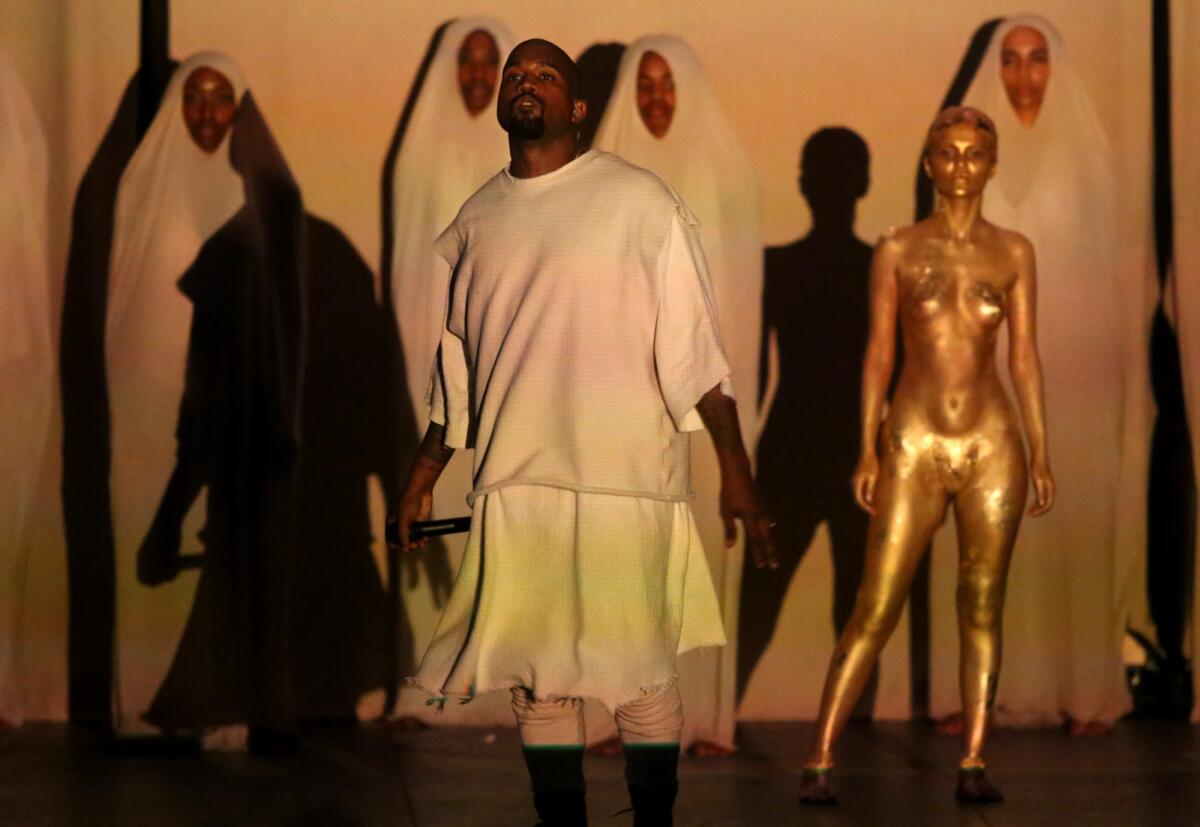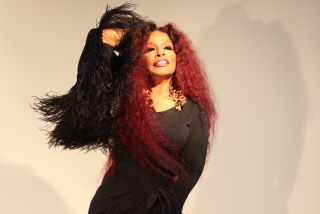Review: Can we talk about Kanye West’s uncharacteristically endearing ‘808s’ show at the Hollywood Bowl?

Kayne West performs songs from his 2008 studio album, “808s & Heartbreak,” at the Hollywood Bowl on September 25, 2015.
- Share via
It took nothing less than an orchestra, a vocal ensemble and 70-plus dancer-performers to bring Kanye West’s most stripped-down album to life at the Hollywood Bowl.
Dressed in an all-white tunic and desert-trek boots (gear that suggested he was prepared for a journey through rough terrain), West opened his performance of the album “808s & Heartbreak” with the haunting “Say You Will.” His voice slightly shaky and unsure, he focused on the orchestra and backing singers, only occasionally making eye contact with the crowd.
The usually overconfident artist was nervous. It’s not easy, after all, to choreograph one’s inner demons into an entertaining stage show.
The rapper, 38, was resurrecting the most personal, painful and ultimately influential record of his career, perhaps hoping to recast history.
SIGN UP for the free Essential Arts & Culture newsletter >>
“808s & Heartbreak,” released in 2008, chronicles the sudden tragic loss of West’s mother, a messy split with his longtime fiancee and the pressure of dealing with it, all in a spotlight that had followed him since those unscripted comments at a Hurricane Katrina benefit (“George Bush doesn’t care about black people”).
Rather than rap against hard beats as he had on his previous three albums, West dropped the armor and sang on “808s.” He Auto-Tuned his shaky voice into one part melodic depressive and one part unfeeling cyborg, dropped in lyrics about deception, alienation and loneliness, then pitted it all against the stark buzz and clank of 1980s synthesizers (the number 808 refers to one such drum machine).
The result is a record that captures the detachment — and ultimate numbness — that comes with feeling too much.
At his Bowl opening Friday, the first of two nights, West did his best to recapture the nihilism, vulnerability and ultimate redemption that has since made “808s” one of the more influential albums in rap (without it, Drake, the Weeknd and Frank Ocean might not exist).
Much like the rapper himself, the production was a mix of attention-grabbing bombast and biting realism, filled with austere beauty and high school melodrama.
Usually a man of many words, West said relatively few as he concentrated on performing the album in its entirety. He moved carefully from number to number, pouring himself into songs such as “Welcome to Heartbreak” as women in white, ghostly shrouds orbited the stage in a slow march that resembled a sort of pilgrimage. The artist’s demeanor was somber in contrast to his recent frenetic set at the FYF Festival or his made-for-social-media ramble onstage at the MTV Video Music Awards. At the Bowl, however, West’s reservations rendered him uncharacteristically endearing.
The performer gradually became more animated with each number, which corresponded with the album’s tonal shifts. Young Jeezy and Kid Cudi joined him onstage at intervals (as they did on the album), bolstering West’s confidence as he embarked on songs that likely brought back times he’d rather forget.
By “Love Lockdown” and “Paranoid,” at least 60 shirtless men — all of color, all rubbed down in white powder — stood behind West on a stage-set of stairs. The glowing white lights above turned red, reflecting his increasingly impassioned delivery. The cast of men dispersed into the crowd, roaming the aisles as if human embodiments of West’s restlessness.
In pure Kanye fashion, though, these raw moments were matched by the melodrama we’ve come to expect from a man who’s showing his line at New York Fashion Week one moment, posing for the paparazzi with his Kardashian bride the next (and all in the wake of his VMAs announcement of a presidential bid).
Onstage, he likened the emotional impact of receiving bad news, in his song “Bad News,” with the violent act of being gunned down. The sounds of gunfire cut through the song, then West fell to the stage floor, writhing in an over-the-top display of pain. It was proof that no matter how big Kanye gets, he still isn’t afraid of appearing entirely immature, if not embarrassingly nerdy.
At the back of the Bowl, an angel-like figure looked down upon the venue, but the heavenly body was in fact a Hollywood star — Zoe Kravitz — who was disguised behind metallic face paint.
For West’s final number, “Pinocchio Story,” he came out covered head to toe in burlap, face obscured, and moved around the stage in as if a puppet on strings. Ridiculous? Yes. And also great.
Like West, the multi-faceted production came with flaws. Between numbers, there were odd pauses that appeared unplanned rather than designed to build tension. Prerecorded backing tracks occasionally wrestled with the orchestra. And the fireworks that were supposed to punctuate various high points in numbers seemed timed for a less complex sort of show, one that perhaps didn’t involve rappers syncing with string sections, marionette sketches and staircases to nowhere.
West rolled with it, though, breaking character at one point to joke about the mistakes with the audience: “This is one of the best dress rehearsals, so excuse me. Best dress rehearsal I ever had.”
It was one of the few times that West, who’s conditioned us over the years to expect his endless monologues, spoke directly to the capacity crowd. But clearly, he’d already connected with the audience. Most stood for the entire set, singing along to songs, watching West bring to life lyrics they had hummed for years.
But nothing illustrated West’s penchant for emotion-fueled spectacle than the snow flurries he unleashed above the audience for “Coldest Winter.” The manufactured snow swirled gracefully as he sang about his mother’s death, its feather-like flakes making it halfway to the ground before they dissolved in the L.A. heat.
It was West’s most wrenching performance of the evening. He sang, “Her love is a thousand miles away,” seated halfway up his staircase to nowhere, grappling with a past he still seems determined to overcome — no matter how complex the production.
Twitter: @LorraineAli
More to Read
The biggest entertainment stories
Get our big stories about Hollywood, film, television, music, arts, culture and more right in your inbox as soon as they publish.
You may occasionally receive promotional content from the Los Angeles Times.











